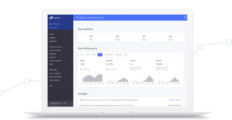Shopping cart software combines standalone applications and embedded commerce services that streamline web buyers’ experience, and make it possible to select and reserve items for purchase before moving to check out. It has become an indispensable tool in this age of the Internet, when online shopping has become a preferred method of acquiring goods and services. Both vendors and buyers depend on such services to close successful deals.
Why use shopping cart software? The purpose of shopping cart software is to support the work of online merchants with larger customer databases, and enable at least a simplified self-service method. On an eCommerce website with a reliable shopping cart service, prospective buyers have the possibility to preselect, reserve, and store items they’d like to own. The cart itself is often the leading element that inspires trust in the shopping process, and lets them know they’re dealing with a professional provider. On the owner’s side of the axis, meanwhile, this leads to accelerated checkout and out-of-the-box possibilities to cross-sell related products, and please customers with ‘just-what-I-wanted’ offers.
Source: Baymard Institute, 2020
Alongside answering the question of what is shopping cart software this guide will solve several productivity seekers’ dilemmas when it comes to purchasing the ideal solution. Since it is difficult to speak of a one-size-fits-all shopping cart tool, you should examine in detail what each product can do, and only then consider investing your money.

What Is Shopping Cart Software?
How Does Shopping Cart Software Work?
What does Shopping Cart Software do? The reason why there are so many possible definition to answer our question, “What is shopping cart software,” is because of the diversity of features these services provide. Shopping cart software varies from fully hosted off-the-shelf solutions you can use without dedicated online stores; to self-hosted and 100% customizable portals you can embed on any already operable location. In both cases, you will get an active and independent analyzer of your shoppers’ data, and be able to discover invaluable hints on what sells, and what causes users to abandon the cart. Therefore, the best and most accurate definition of shopping cart software would be “a shortcut to more productive and effortless selling.”

A modern shopping cart software like Shopify gives you flexibility in organizing products by variant.
Benefits of Shopping Cart Software
Shopping cart applications support eCommerce efforts in a variety of ways, which is why satisfied customers report a number of notable benefits after they’ve deployed one. Speaking of the main advantages of shopping cart software, here are the immediate benefits:
- Safer shopping. Most online stores decide to get a shopping cart application because of security issues, keeping in mind that payment and transactions are facilitated and well administered. With a licensed cart in place, customers have the peace of mind that their money will arrive safely to the desired destinations, and so will you.
- Convenient shopping. Thinking from a buyer’s perspective, would you rather consider a site where you can store and manage your orders, and make them separately; or one where you would always be expected to repeat the browsing session, and undergo tedious selections again and again? We all shop online because of the unwillingness to visit an actual store and choose, and that’s where shopping carts work out their magic – they enable us to serve ourselves.
- A single hub for data management. A shopping cart is not only a tool customers will “pass through,” but also an intelligent base collecting information and revealing patterns, alongside calculating important product stats. It will maintain the order and payment history of each consumer, collect and process credit card information, and provide invaluable stats on selling trends for different time periods.
- An official storefront for your business. A good shopping cart will ensure easy access to selected products/services, but also intelligently pull off other related pages that may be of interest to the customer. As part of a constantly evolving technology field, the cart will adapt easily to the user’s browsing criteria, and further improve the shopping experience by keeping track of everything customers are doing. This will help them develop a more professional image of what your brand can do for them.
- Easy payments. Another important benefit of shopping cart software is being able to collect payments in a hassle-free way, as it gives you all processing features you need to charge customers without asking them to abandon the platform. This means processing credit cards and connecting easily to bank accounts; working in synergy with leading gateways, and triggering an immediate process of billing & invoicing with or without a third-party connection. Plus, a reliable cart is the only way to ensure you will process each and every payment.
- Shopping analytics & performance management. To ensure that all transactions are running smoothly, shopping carts organize and categorize information in historical sections, and even process the data to showcase it visually and let the owner understand the health of his performance. Most of the popular shopping carts impose no restrictions to as how many transactions you can process, and will scale easily as your database increases.
- The Special-Offer trick. Shopping carts come packed with advanced marketing functionalities that help retain customers and acquire new ones. They will let consumers create wish lists, access a detailed product/service catalog, use promotional and discount coupons, and much more.
- The feedback. Shopping carts are among eCommerce businesses’ most important experience management assets, at the core of each and every evaluation process. After a successful (or unsuccessful) process, customers will be asked to rate your service and provide tips on improvement, which means you will have first-hand-experience information to work with.

Wix allows you to create an ecommerce site on the fly.
Features of Shopping Cart Software
How does shopping cart software work? Different solutions offer different plans and feature set. But generally they share common functionalities. Here are the standard features of shopping cart software.
- Easy administration. Shopping carts come with an excellent administration panel where you can store items, update data, and set different permissions. The panel is usually featured by a straightforward layout and easy navigation, and presents data in logical folders and subfolders to put all functionalities at your disposal.
- Functional product displays & Catalogs. Shopping carts enable visual communication with customers, providing them with excellent product images and descriptions, and a variety of searching controls. They are usually flexible enough to allow the user to resize, zoom, or save an image, and could even feature videos and animations.
- Product/Service reviews. It is the shopping cart where prospective buyers read on other users’ experience, and where they will eventually provide their feedback as well. Rating stars and evaluation fields are also a great option to help users make the right decision.
- Selection filters. Faceted navigation is imperative to any shopping cart solution, which means you should be looking at a product that comes with a functional search button, and a variety of filters that will help buyers eliminate shortlist products they like. In a retail store, for example, the shopping cart should have color, material, size, and other related filters.
- Checkout pack. Shopping carts make checkout fast, efficient, and secure, giving the buyer a chance to complete an order and pay for it without using third-party services. This means that your shopping cart should be able to process credit card payments and synchronize with different payment gateways, and ideally support a billing/invoicing technology that will keep buyers updated on the status of their order. In the meanwhile, the shopping cart will monitor the shipping process, and update the buyer on any potential changes.
- Special offers. It is the shopping cart that helps online vendors engage and retain customers, and it does so by collecting valuable customer data. Once the buyer is in your database, you can prepare special offers, offer coupons and discounts, or even promotional prices for loyal customers. In addition, the shopping cart can at any time offer a subscription option for the users,
- Analytics & Reporting. Shopping carts gather invaluable intelligence for the vendor, either using their own processing capabilities, or relying on a third-party integration such as Google Analytics. This will help you depict positive and negative sales trends, track your orders, and distinguish prospective buyers from prospective abandons.
- Integrated chat support. Shopping carts have a role through the entire purchase process, which is why they must also ensure the customer will have the adequate support and answer to his questions. This is why you should be looking at a shopping cart that offers an integrated chat capability, and be there for the customer at any moment.
- Integrations with third-party software. The best shopping carts offer a long list of native integrations with eCommerce platforms and marketplaces, BI solutions, CRM tools, inventory management & accounting apps, and similar systems.

Analytics is a key feature in shopping cart software, as seen here on a Volusion dashboard.
How much does Shopping Cart Software cost?
The cost of shopping cart software depends on a variety of factors, the main of which are the number of products/customers one wishes to manage; and the availability of advanced features and premium support. The possibility to find and embed a free-to-use shopping cart is not excluded, but you should have in mind that these systems are dedicated to sole retailers and SMBs with a limited number of orders.
The usual approach to enterprise pricing in this case is to put in place a flexible scheme, and design packages for small, medium, and large businesses with a different number of users. In this case, expect to pay a monthly subscription between $20 and $120 without commitment, and slightly less when subscribed for the entire year. Keeping a close eye on discounts and promotions is always a smart idea, as it may happen that you get a great cart at 50% of the actual price. Single-payment, on-premise, and licensed shopping carts are also available, but they usually cater to the needs of large and international marketplaces.
Last, but not least, you will come across quote-priced shopping cart software, namely applications whose price is calculated on dot, and takes into account the specific needs and financial capacity of the buyer. The usual approach there is to contact the sales department for registration, or to use a dedicated online calculator.
Examples of Shopping Cart Software
Often, the quickest way to choose the right solution is to compare the top players in the niche. To give you an idea of the major solutions in this category, here are a few examples of shopping cart software:
NetSuite
NetSuite SuiteCommerce: NetSuite SuiteCommerce is an eCommerce software that brings together your point-of-sale, eCommerce, and back-end systems to give customers an engaging experience. SuiteCommerce provides customers with the ability to buy, fulfill, and exchange products from anywhere. With access to real-time data, B2B and B2C merchants can grow and transform their business.
Wix
Wix: Free to help sole retailers and small businesses set up commerce websites, but also offers premium packages for all-inclusive stores. It lets you choose from hundreds of stunning templates, and functions impeccably on mobile devices. The same drag-and-drop builder can be used for crafting other types of websites.
BigCommerce
BigCommerce: BigCommerce is a comprehensive solution that packs enterprise-grade functionalities. It features a drag-and-drop page builder designed to help users set up an online store quickly. BigCommerce also offers a number of payment gateway integrations and supports several shipping providers, making order fulfillment using just one platform possible. This solution also integrates with popular marketing, business, and social media apps such as MailChimp, Zendesk, Salesforce, and Facebook.
Salesforce
Salesforce Commerce Cloud: Salesforce Commerce Cloud is an industry-leading eCommerce software that unifies your online and offline channels to one AI-powered platform. This top-rated software helps B2B and B2C merchants sell faster and smarter and deliver a consistent customer journey from various touchpoints. Ultimately, they can boost conversion rates and bring in more revenue.
Shopery
Shopery Marketplace: A digital marketplace builder built for simple multi-vendor management, Shopery Marketplace provides users with full control and transparency over all their vendors. It comes equipped with key functionalities that simplify the way you run your digital marketplace, including automated seller onboarding, catalog management, payment management, promotional spaces, marketing and sales functionalities, and much more.
Shopify
Shopify: One of world’s leading and most internationally used shopping carts, catering to more than 120,000 stores in the world. It comes packed with retail-exclusive features, including the possibility to set up a ready and functional store and run it from day one. It recovers abandoned carts automatically, and supplies you with powerful marketing features, easy to use reports, and run your own payment gateway.
Volusion
Volusion: Adopts the role of a personal eCommerce assistant for solo and freelance entrepreneurs, and helps them build attractive eCommerce websites. So far, Volusion-empowered platforms helped place around 185 million orders, and brought in an incredible revenue of $26 billion.
3dcart
3dcart: With 3dcart’s powerful eCommerce platform, users can easily build their online stores and achieve success thanks to its wide set of features as well as partnerships with over 200 leading business service providers, ranging from shipping carriers, tax calculators, payment solutions, and more.
Potential Issues
The use of shopping cart software is not without issues, mainly around these common problems. However, with proper caution it is easy to resolve the issues, which are easily outweighed by the benefits.
- Fraud issues. Compared to a physical store, shopping carts leave a larger number of open security gaps and possibilities for the merchant not to comply with the order’s conditions. Merchants, on the other hand, risk fraudulent repudiation of their online purchases, despite of the fact that credit card numbers are promptly protected with SSL encryption.
- No full cost disclosure. Another serious concern of online shoppers is the lack of cost disclosure, given that in most cases they are not able to see the total price before the last step of the check in. This means that what they see is the price of the product, excluding additional fees such as taxes and shipping costs.
- Lack of interactivity. Shopping carts often cause owners to fall short of hands-on inspection, especially with customers having to rely on pictures and foreign opinions to make a decision. The feel of genuine merchandise and exchange of information, as well as the feel of confidence is often absent in online shopping, and customers often consider they’ve not been given the attention they deserve.
Shopping Cart Software Market Trends
What lies ahead for shopping cart software? We can think of three scenarios in the next few years.
- A more personalized shopping experience. In response to the “impersonal shopping” issue, developers of carts are focusing heavily on developing tools that will make customers feel more welcomed. Systems of the future will lean on and adapt to seasonal and temporary changes of buyers’ behavior, so that each client will receive the service he’s after.
- Product testing and predictive marketing. Analytics will become even more important in the future, and merchants will be able to associate their carts with a variety of business intelligence tools to perform complex examinations. Products will be subjected to multiple tests and experiments for merchants to develop working strategies, and to create targeted, successful email campaigns.
- Tighter integrations with social media. Expect shopping carts to be tightly integrated with leading social media platforms, so that you can track traffic and marketing campaigns, and coordinate teams and agents selling on different locations.
Factors to Consider When Choosing Shopping Cart Software
When selecting shopping cart software, it’s important to consider several key factors to ensure the software meets your business needs and provides a seamless experience for your customers. These factors include:
- Ease of Integration: Ensure that the shopping cart software can easily integrate with your existing systems, such as inventory management, accounting software, and payment processors. This minimizes disruptions to your workflow and makes it easier to scale your business.
- Security Features: With the increase in online transactions, security is a top priority. Look for software with strong encryption protocols and compliance with industry standards like PCI-DSS. This protects both your business and your customers’ sensitive data.
- Customization Options: Depending on your brand’s needs, the ability to customize the look, feel, and functionality of the shopping cart can be crucial. Some software offers built-in templates, while others may allow full control over the design to match your website’s branding.
- Mobile Compatibility: As mobile shopping continues to rise, it is essential to ensure that your shopping cart is fully responsive and optimized for mobile devices. This enhances the user experience and can lead to higher conversion rates.
- Customer Support and Resources: Reliable customer support is crucial, especially if you encounter technical issues. Consider software that offers 24/7 customer support, documentation, and a community forum for troubleshooting and advice.
- Pricing and Transaction Fees: Different software options have varying pricing models—some charge a monthly fee, while others take a percentage of sales. Understand these fees upfront to avoid unexpected costs.
- Scalability: As your business grows, your shopping cart software should be able to scale with you. Choose a solution that can handle increasing products, transactions, and customer accounts without slowing down.
Key Insights
- Enhanced Customer Trust: Shopping cart software builds customer trust by offering a professional and seamless shopping experience. Features like secure payment processing and efficient order management reassure customers about the credibility of the online store.
- Streamlined Shopping Experience: These platforms simplify the shopping process for customers, allowing them to preselect, reserve, and store items. This convenience often leads to increased customer satisfaction and loyalty.
- Comprehensive Data Management: Shopping cart software acts as a centralized hub for managing customer data, transaction history, and sales analytics. This data can be leveraged to gain insights into buying patterns and improve marketing strategies.
- Integrated Payment Solutions: Most shopping cart solutions offer integrated payment processing, supporting various payment gateways and ensuring that transactions are smooth and secure.
- Marketing Capabilities: Advanced shopping cart software includes marketing features such as promotional offers, discount codes, and customer loyalty programs, which can drive sales and enhance customer retention.
- Flexibility and Customization: These platforms often come with customizable templates and integration options, allowing businesses to tailor their online stores to specific needs and branding requirements.
- Cost-Effective Solutions: Shopping cart software is available in various pricing models, including free, subscription-based, and quote-based plans, making it accessible to businesses of all sizes.
- Future Trends: The market is moving towards more personalized shopping experiences, enhanced predictive analytics, and tighter integration with social media platforms to improve customer engagement and sales.
FAQ
1. What is shopping cart software?
Shopping cart software is a tool that supports online merchants by enabling customers to preselect, reserve, and store items they want to purchase. It facilitates secure payment processing and provides valuable data insights to improve sales and customer satisfaction.
2. How does shopping cart software work?
Shopping cart software integrates with an eCommerce website to manage the entire shopping process. It allows customers to add items to their cart, proceed to checkout, and make payments securely. It also tracks customer data, order history, and sales analytics.
3. What are the benefits of using shopping cart software?
The benefits include safer and more convenient shopping, centralized data management, easy payment processing, marketing capabilities, improved customer trust, and comprehensive sales analytics.
4. How much does shopping cart software cost?
The cost varies based on features, the number of products/customers, and support levels. Pricing models include free plans, monthly subscriptions ranging from $20 to $120, annual subscriptions with discounts, and quote-based plans for larger enterprises.
5. Can I use shopping cart software with my existing website?
Yes, most shopping cart solutions offer integration options that allow them to be embedded into existing websites, providing seamless functionality and enhancing the user experience.
6. What features should I look for in shopping cart software?
Key features include easy administration, functional product displays and catalogs, product reviews, selection filters, efficient checkout processes, special offers, analytics and reporting, integrated chat support, and third-party software integrations.
7. What are some examples of shopping cart software?
Examples include NetSuite SuiteCommerce, Wix, BigCommerce, Salesforce Commerce Cloud, Shopery Marketplace, Shopify, Volusion, and 3dcart. Each offers different features and pricing models to suit various business needs.
8. What are the potential issues with shopping cart software?
Common issues include fraud, lack of full cost disclosure, and a lack of interactivity. Proper security measures and transparent pricing can mitigate these concerns.
9. How is the shopping cart software market evolving?
Future trends include a more personalized shopping experience, enhanced product testing and predictive marketing, and tighter integration with social media platforms to improve customer engagement and sales.
10. Why is shopping cart software important for my online business?
Shopping cart software is crucial for providing a seamless and secure shopping experience, managing customer data and transactions efficiently, and leveraging marketing tools to boost sales and customer loyalty.

























Leave a comment!